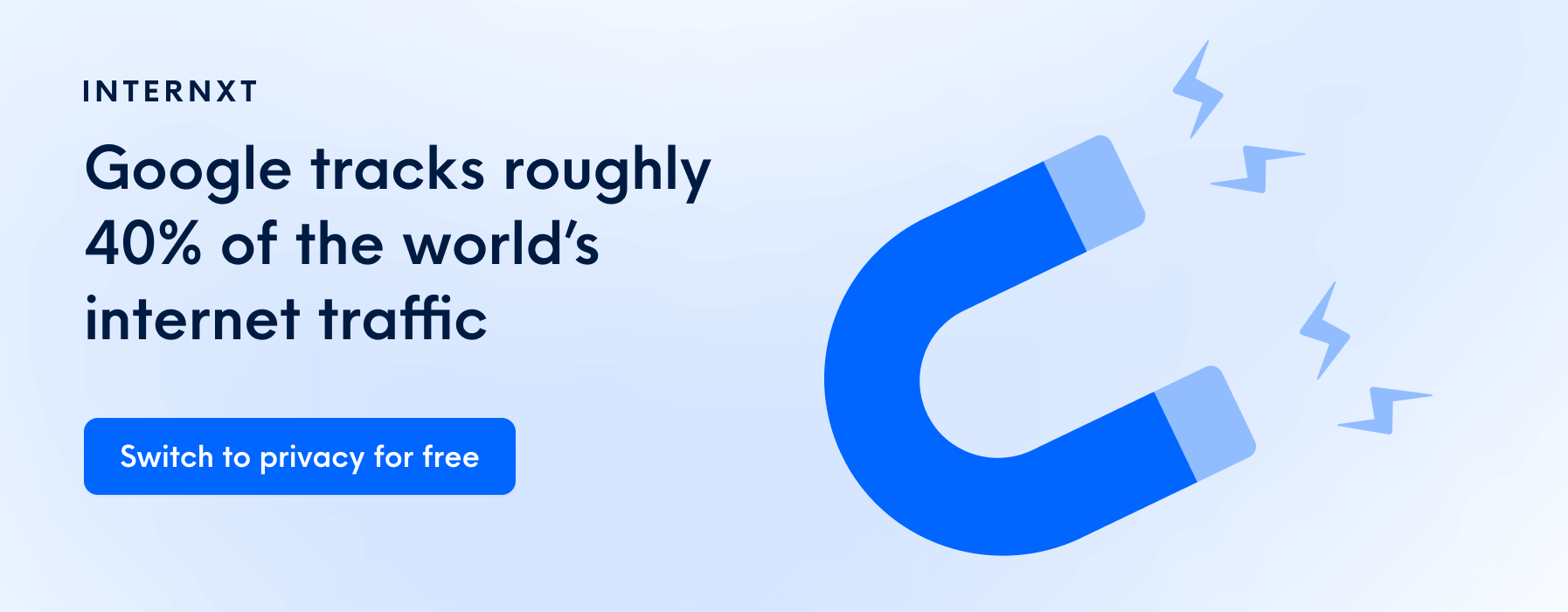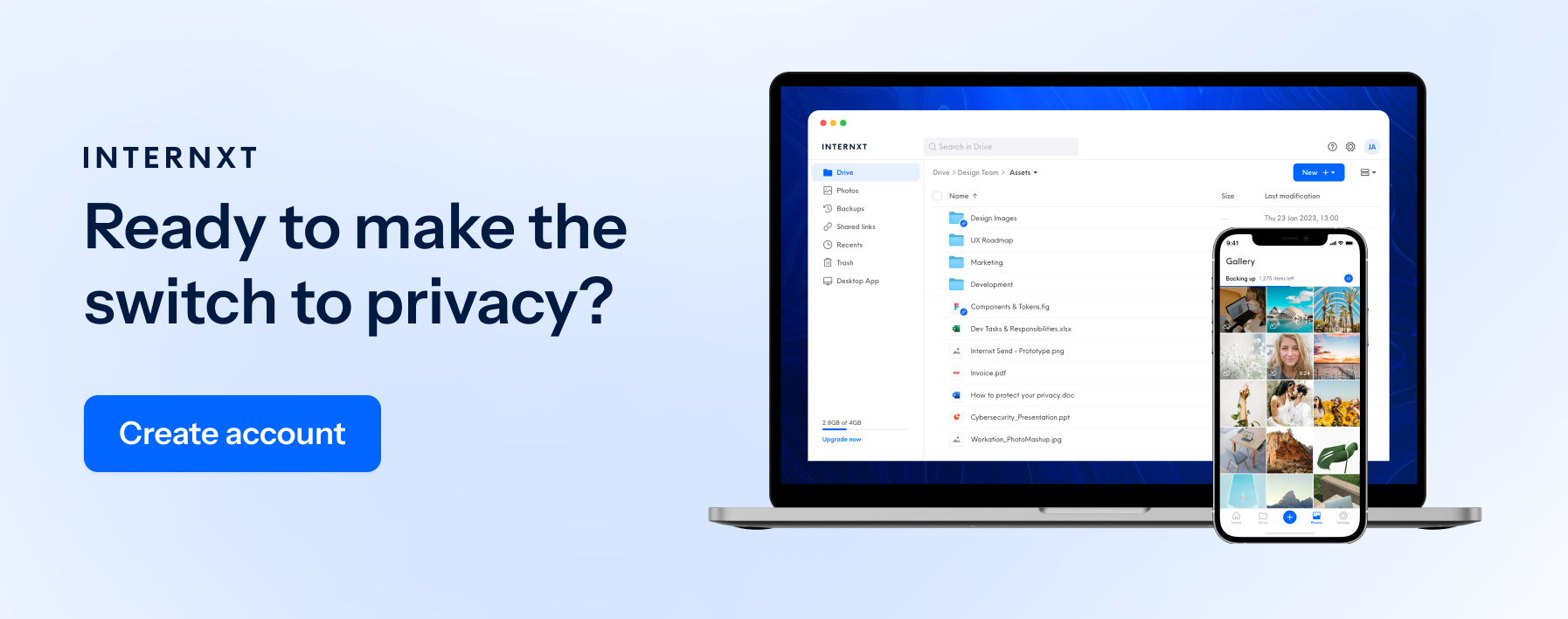How Google Tracks You: The Personal Data Google Steals and Sells

Google is the most popular search engine on the planet. And there’s a good reason for that: their search service is extremely thorough, clean, and comprehensive. Need to know something just “Google it”. But there’s a catch—when you use Google to learn, Google is also learning about you.
At Internxt we always try to give you tips on how to improve your privacy by recommending safe online practices to follow when using the internet and providing free information regarding your privacy.
So believe us when we say: “Google should be avoided whenever possible!”
Not because their services and hardware aren’t high quality, they produce some amazing products after all, but all of that shiny tech comes with a massive privacy cost. The tech giant is non-stop collecting your data, all of it. From your clicks to your search and browser history, to all the purchases you make.
Why? What kind of stuff do they collect and what do they do with all that data? Find out and learn what you can do to (mostly) prevent Google from gathering even more data about you below.
Fact: Google Collects Your Data
The truth of the matter is Google makes its money by collecting and sharing user data.
Based on the search and browsing history gathered on Google-owned sites like YouTube, the search giant creates multidimensional profiles of individuals. It then uses that stockpiled information to create an advertising profile then sells adverts to companies based on the demographics or profile types they would like to engage.
Where’s the proof? How can we be sure this is going on? Well, in recent years, there have been numerous high-profile cases taken to court alleging (and ruling) user privacy violations by Google.
- In 2007, the European Union took Google to court over its privacy policy and lack of compliance with European data protection laws. The case ended with Google stating that “their privacy policy was vague”
- In 2010, Google received another lawsuit over the company's collection of people’s private information through its Street View project and ended up paying $13 million in fines
- In 2019, Google and Youtube paid $170 million for violations of the Children’s Online Privacy Protection Act (COPPA). They illegally collected personal information from children without their parents’ consent
- In 2020, Google was hit by a lawsuit from a company that claimed that Google was violating the privacy of its users through their incognito mode. Incognito mode is meant to preserve the user's privacy as it (supposedly) doesn't save browsing history and web cookies. The lawsuit claims that Google intercepts search queries, browser history, specific website URLs, IP addresses, and other information. If Google is found to be guilty, the company may face fines of up to $5 billion for privacy violations involving hundreds of millions of Chrome users
- This year in 2022, Google has also been accused by the state of Texas of invading users' privacy by tracking geographic locations. Again, this was this year, even as Google still insists they have been trying to clean up their image regarding privacy, breaches of public trust keep happening
These are just some of the most notorious cases, but there are surely many more. Do your own research, just don’t “Google it!”

What Kind of Data Does Google Collect?
When you use Google services they quickly begin to track your data. Google services have access to your personal information, email content, where you live, where you work, your interests, the websites you visit, the videos you watch, ads you click, your device location, IP addresses, cookie data and so much more:
- Unique identifiers
- Browser type and settings
- Device type and settings
- Operating system
- Mobile network information including the telecom company and phone number
- Application version number
- IP geographic location
- Regional geographic location
- Preferred language information
- Search terms on Google
- Videos you watch
- Views and interactions with content and ads
- Voice and audio information when you use audio features
- Purchase activity
- People you communicate or share content with
- Activity on third-party sites or apps that use Google Services
- Chrome browsing history when synced with your Google Account
- Page-view data
- Website analytics: Sessions by page, users by location, pageviews by device, average time on page by channel, bounce rate by channel
- Campaign data
- Browser properties
- Visitor IDs
The list certainly goes on and that’s all we’re aware of. Not to sound like a tin-hat-wearing conspiracy theorist, but for all, we know they collect much more data in ways we could only imagine.
Google, apart from some Chromium applications, is not open-source and therefore unverifiable. We can’t know what is going on under the hoods and behind the scenes like we can with open-source services, like Internxt, that protect your data.
You can look up all your Google activity, stuff like your YouTube history and preferences, your Google location history, and even your Google Maps timeline, by signing into your Google account.
While Google's data collection practices have raised concerns about user privacy, it's important to note that individuals can still potentially benefit from using Google's services, such as through making money on social media platforms like Instagram. However, it's important to be aware of the potential risks and trade-offs involved in sharing personal information online.
What Google Does With Your Information
Basically, Google collects as much information as possible from users in order to be able to offer them more personalized ads (sometimes they even sell it to ad creator companies). With all of this information about you, Google can target you better with advertising in order to make a huge profit and, admirably, fund the free services you use.
Thanks to Google Ads, the tech giant earns billions of dollars a year, so they are not going to stop collecting data anytime soon. So what can you do to prevent them from making money off your personal data?
How To Prevent Google From Stealing Your Data
You can’t completely stop Google from snatching your info but what you can do is adjust your settings to opt-out of most data collection. Google is required to inform you (when you ask) about what they collect and allow you to decline access. You can also boost your security for Gmail and other services with a few clicks.
In the settings section of Google services or app, be sure to thoroughly check its privacy setting to give or decline permissions. This is a good habit to do with all web services, not just Google. If you skip this process, data tracking is enabled by default and your information will eventually end up in the hands of third parties.
Also, you should know that all browsers (especially Google Chrome), have options to set your cookies according to your privacy preferences.
Make sure to always follow safe online practices and explore other secure cloud services if you’re uncomfortable with sharing your information.

Google Alternatives?
The good news? Google is not the only search engine option out there. There are many other browser options that are more ethical and much more careful with your privacy such as DuckDuckGo, Brave, Tor Browser, or Firefox Browser.
Shop around for the best Google alternatives for you and keep an out for open-source ones. Switch to LibreOffice instead of Google Workspace. Use Linux instead of Chrome OS or DeepL instead of Google Translate.
Don’t want Google Drive snooping on your files? Give Internxt a try!

